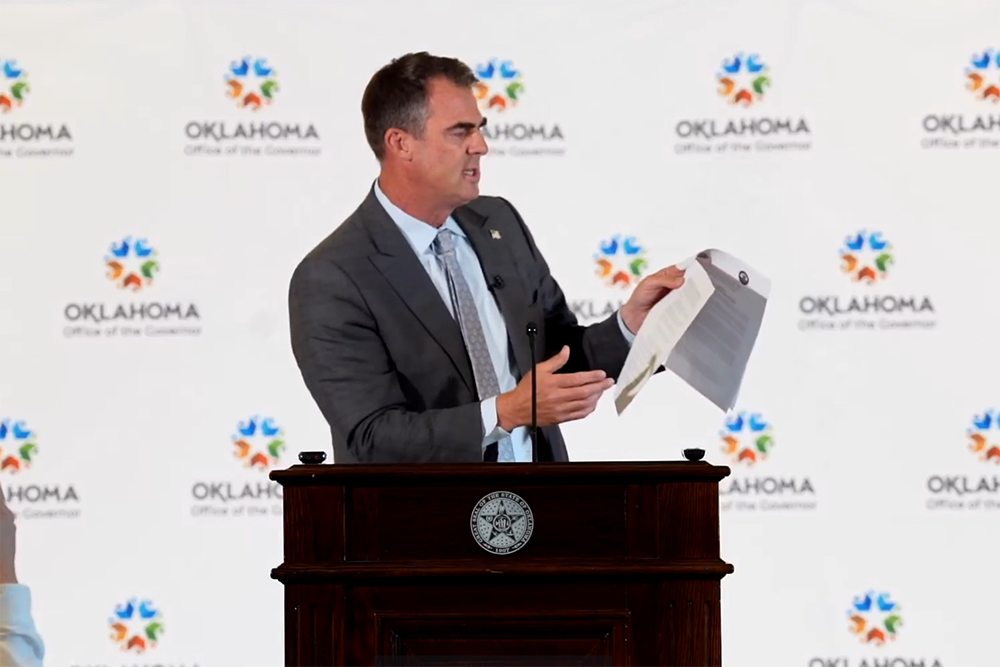
- Details
- By Native News Online Staff
OKLAHOMA CIRY — Republican Governor Kevin Stitt has filed a lawsuit against the leaders of the Oklahoma state legislature, alleging they’ve overstepped their bounds in shunting him out of negotiations over tribal compacts.
Stitt announced that his team filed a lawsuit against House Speaker Charles McCall and Senate Pro Temp President Greg Treat, both Republicans, Monday afternoon following a House vote to override Stitt’s veto of HB1005, which extends 16 existing tribal compacts surrounding the split of tax revenues from tobacco sales on tribal lands.
 Make A Monthly Donation Here
Make A Monthly Donation Here
The House of Representatives voted 74-11 on Monday to override Stitt’s veto of the bill, preserving the existing tobacco sales compacts through December 31, 2024 after the Oklahoma Senate voted to override last week. The votes followed a similar override of SB26, which extends existing tribal compacts regarding revenues from motor vehicle registrations.
“We need the Supreme Court to let us know who has the authority. We think that it clearly is with the Governor,” Stitt said. “We need the courts to tell us, does the governor have the authority to negotiate the compacts, or does the legislature have the authority to negotiate the compacts? We’re really excited for the Supreme Court to weigh in on this and let us know what we're supposed to do on these matters.”
Stitt said the divide stemmed from his insistence on restricting tribal revenue collections to retail outlets on restricted or trust lands, rather than all lands designated as reservations. Tribes have instead pushed for revenue collections through all their owned businesses.
In combination with ongoing discussions of what tribes have jurisdiction over on non-trust lands through Supreme Court cases like Hooper v. Oklahoma and Strobel v. Oklahoma, the governor insisted that conceding on these compacts would amount to turning “42 percent of Oklahoma into a reservation for all purposes.”
“I don't think that's good for Oklahomans. I don't think people in Tulsa want that to happen,” Stitt said during the press conference. “...I am doing everything in my power to protect Oklahoma and have one set of rules regardless of where you live.”
In a statement from the Oklahoma Senate, Treat rebuked Stitt’s tactics, calling the lawsuit a further example of Stitt’s “divisive” approach to cooperating with the state’s 39 federally recognized tribes.
“Plain and simple, the governor’s continued rhetoric and vitriol surrounding not only these compacts, but also our Native American Tribal partners as a whole, seeks to divide the state. It is clear at this point the governor has no end game, goal or aspirations of working with the legislature or tribes. He continues to ignore the courts, legislature and common sense,” Treat said in the statement. “He has once again failed Oklahoma.”
This isn’t the first time Stitt has butted heads with the Oklahoma legislature. In 2020, Stitt attempted to enter into gaming compacts with the Comanche Nation and Otoe-Missouria Tribes, per a case summary of Stitt v. Treat. Those compacts included Class III gaming, which the legislature contended should first be approved through the House and Senate prior to authorization. The decision eventually landed on the side of the legislature.
Treat said Monday’s lawsuit was another attempt that would cost Oklahoman taxpayers millions in legal fees - and would result in similar failure.
"Today, history is repeating itself with the announcement of this lawsuit. I’m confident his intentions will meet the same fate as we have unfortunately witnessed, and paid for, in the past,” Treat said. “By overriding these vetoes, the legislature gave the governor another avenue and opportunity to negotiate in good faith, as we have done repeatedly. He has never accepted or appreciated our efforts and has turned his back on all four million Oklahomans, the legislative process and Oklahoma’s tribal partners, costing the state millions in legal fees. This zero-sum game he is playing is a losing strategy and I hope Oklahomans and my fellow lawmakers are paying careful attention.”
More Stories Like This
Court Grants Tribal Nations’ Motion to Intervene to Protect Chuckwalla Homelands‘This is who we are’: Northern Cheyenne Tribe reclaims cultural belongings from UM
Indian Gaming Association Condemns CFTC Over Prediction Markets, Warns of Threat to Tribal Sovereignty
Committee Advances 20% Increase to Navajo Child Support Guidelines
Navajo Committee Advances $84M Transportation Improvement Plan
Help us defend tribal sovereignty.
At Native News Online, our mission is rooted in telling the stories that strengthen sovereignty and uplift Indigenous voices — not just at year’s end, but every single day.
Because of your generosity last year, we were able to keep our reporters on the ground in tribal communities, at national gatherings and in the halls of Congress — covering the issues that matter most to Indian Country: sovereignty, culture, education, health and economic opportunity.
That support sustained us through a tough year in 2025. Now, as we look to the year ahead, we need your help right now to ensure warrior journalism remains strong — reporting that defends tribal sovereignty, amplifies Native truth, and holds power accountable.
 The stakes couldn't be higher. Your support keeps Native voices heard, Native stories told and Native sovereignty defended.
The stakes couldn't be higher. Your support keeps Native voices heard, Native stories told and Native sovereignty defended.
Stand with Warrior Journalism today.
Levi Rickert (Potawatomi), Editor & Publisher

